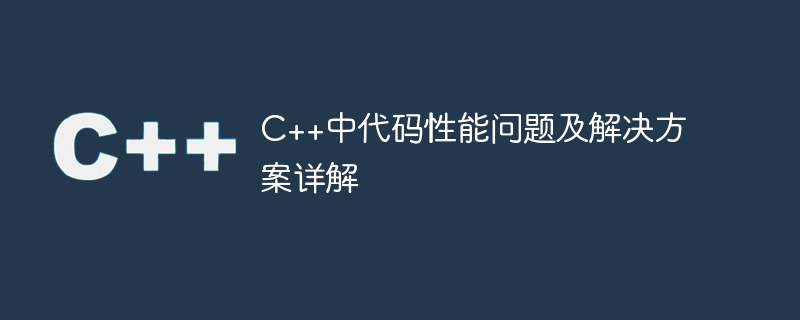Home >Backend Development >C++ >Detailed explanation of code performance problems and solutions in C++
Detailed explanation of code performance problems and solutions in C++
- PHPzOriginal
- 2023-10-09 19:48:33945browse

Detailed explanation of code performance problems and solutions in C
Introduction:
In the software development process, performance issues have always been the focus of developers one. Especially in high-performance programming languages like C, how to optimize code performance has become a challenge that developers must face. This article will discuss some common performance problems in C and provide corresponding solutions and specific code examples.
1. Memory management issues
- Memory leak:
Memory leak refers to the failure to correctly release the allocated memory space during the running of the program. Resulting in increasing memory usage, eventually causing the program to crash. A common way to solve memory leak problems is to use smart pointers. Smart pointers are an automatic memory management mechanism provided by C, which can avoid the problem of forgetting to release memory. The following is a sample code for a smart pointer:
#include <memory>
void func() {
std::shared_ptr<int> p = std::make_shared<int>(10);
// 使用p进行一些操作
// ...
// 不需要手动释放内存
}- Memory copy:
Memory copy operation is time-consuming, especially when facing large data structures. If memory copies are performed frequently in the code, the efficiency of the program will be reduced. To avoid this problem, move semantics can be used instead of memory copies. Move semantics reduce unnecessary memory copy operations by transferring resource ownership from one object to another. The following is a sample code using move semantics:
class MyObject {
public:
MyObject() : data(new int[10000]) {}
MyObject(MyObject&& other) : data(other.data) {
other.data = nullptr;
}
private:
int* data;
};
void func() {
MyObject obj1;
MyObject obj2 = std::move(obj1);
// 对象obj1的资源所有权已经被转移到obj2中
// obj1现在变为无效状态
}2. Algorithm optimization problem
- Loop optimization:
In C code, loop operations It is one of the most frequent operations. In order to improve the execution efficiency of the loop, the following optimization methods can be used:
- Reduce the number of irrelevant operations: Try to reduce the number of irrelevant operations in the loop body, such as moving the calculation of expressions to the loop outside.
- Reduce the number of memory accesses: Reducing the number of memory accesses can effectively improve the performance of the loop. In the code, calculation results can be cached to reduce memory read operations.
- Use loop expansion: Loop expansion refers to merging multiple loops into one loop to reduce the number of loops and thereby improve performance. The following is a sample code for loop expansion:
int sum = 0;
int nums[10000] = {1, 2, 3, ...}; // 假设有一万个元素
for (int i = 0; i < 10000; i += 4) {
sum += nums[i] + nums[i+1] + nums[i+2] + nums[i+3];
}- Data structure selection:
Selecting the appropriate data structure is also an important part of optimizing code performance. Different data structures have different performance in different application scenarios. For example, linked lists are suitable for frequent insertion and deletion operations, while arrays are suitable for random access and iteration operations. Therefore, when choosing a data structure, you need to make trade-offs based on specific application scenarios. The following is a sample code using arrays and linked lists:
std::vector<int> vec;
for (int i = 0; i < 10000; ++i) {
vec.push_back(i); // 使用数组
}
std::list<int> lst;
for (int i = 0; i < 10000; ++i) {
lst.push_back(i); // 使用链表
}Conclusion:
This article introduces some common performance problems in C, and provides corresponding solutions and specific code examples . Of course, optimizing code performance is not an easy task and requires trade-offs and trade-offs based on specific application scenarios. I hope this article can provide some help to readers in C code performance optimization.
The above is the detailed content of Detailed explanation of code performance problems and solutions in C++. For more information, please follow other related articles on the PHP Chinese website!

